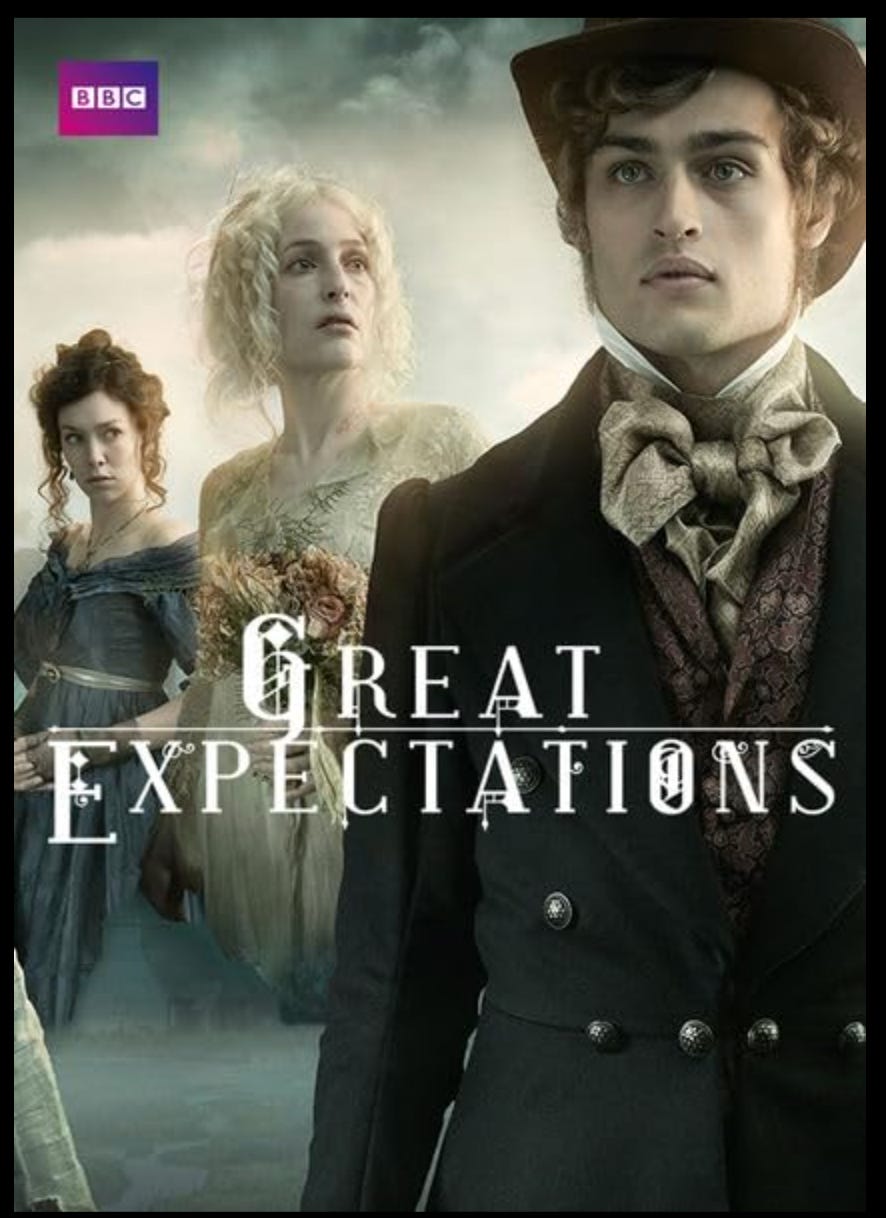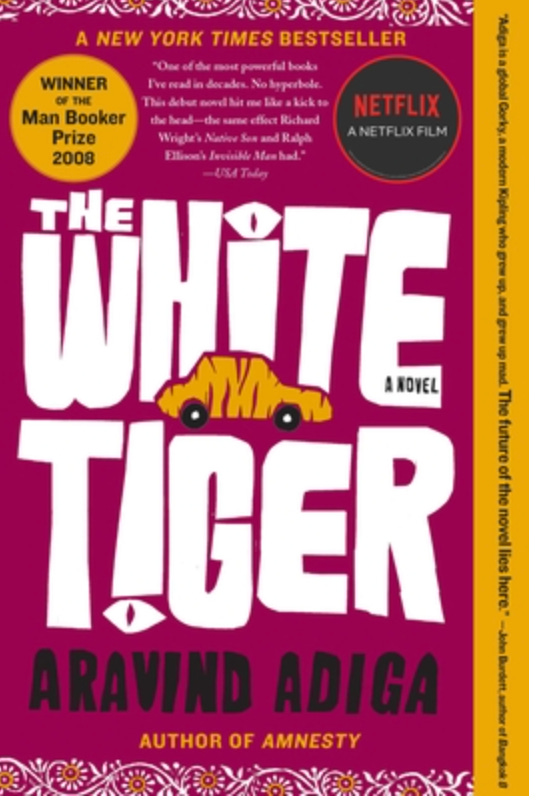The rich, the poor, and my (not so great) expectations
Dickens and David Roberts: money, morality, and being human
Before we begin…
How do you define poor? How do you define rich? How comfortable are you when you are with people who you are richer or poorer than you are? How does the wealth or absence of it in others impact your expectations of them, if at all?
Welcome! You’ve reached Spark. Learn more here or just read on. If you received this from a friend, please join us by subscribing. All you have to do is press the button below. If you have already subscribed, welcome back! And if this email is truncated in your inbox, just click the headline above to come on through and read everything all at once.
Unsettling questions
Pip
I recently finished Dickens’ Great Expectations. If I’d ever read it before, it was long ago, when I was a kid. More likely, I watched a television series or a movie that left me hazy memories of Miss Havisham and her yellowed wedding dress, the mists rising up from the marshes, a little boy whose future was upended by the unexpected arrival of money from an unknown benefactor.
There I was, rolling along in the waves of Dickens’ vivid descriptions, humor, inventiveness, and well-drawn characters when I realized that this would not be a feel-good story the way David Copperfield was for me when I read it during the summer. Pip, the young boy, is as resilient as David Copperfield but not as soft, or loveable. He is more damaged by his circumstances, a little meaner, a little hungrier, less able to judge who to trust, and more willing to hurt those who love him in order to gain. The entire first part of the story is full of more darkness than light: an abusive guardian, a damaged rich woman in her wedding rags, convicts who terrify him, a young girl who treats him coldly.
When the money arrives, it is not just a single grand sum but the promise of fortune on a far grander scale than anything Pip could ever have imagined. He is now to “be brought up as a gentleman – in a word, as a young fellow of great expectations.”
The title is perfect, is it not? The “expectations” refers to the potential that comes with the money: education, security, comfort, home, good marriage, a profession if he wants one. The money also creates distance between Pip and those he came from, a distance to which he contributes because of what he believes is expected of him as a soon-to-be “gentleman.” I immediately began to expect more of Pip. he would grow into a good man who could see the value in people who had no expectations of him. I wanted to find out what he expected from himself. He made me wait much longer than was comfortable and I found myself increasingly unsure as to how I would have handled such a change in circumstances.
I fell right into this novel not because I loved this character, the writing or the wonder that is Dickens, but because he raises hard questions about morality and money. Does having money confer greater responsibility? Is money a key to freedom or a trap? Whose expectations ultimately guide our decisions - our own or those of others?
It’s one thing to consider these questions through the lens of good fiction. It’s another to examine how they play out in real life. This is one reason I find reading
’ Substack compelling – even though reading it often provokes irritation and discomfort that I end up rushing past on my way to judgment. You may already read his Substack but if not, here it is. Start with this post and then read this frank interview with Anne Kadet in .David Roberts
David Roberts is, by his own description, very wealthy. In his essays he gives us a glimpse into what that looks like for him, his family, and his circle of friends and acquaintances. He carefully avoids anything that sounds like bragging, though. He is, instead, trying to lift the curtain that separates most of us from the realities that are every-day for him and to explore the same questions that run through my mind and the minds of many: how to be good. How to live a moral life.
Roberts loves his life. He loves his family. He also loves staying in very expensive hotels, his house in the Hamptons, his Manhattan apartment. He also writes that having money means he carries a greater burden to behave well. He’s not always sure what that should look like or what he is prepared to do. He appears to be exploring what would be “enough.” He’s doing this in public, sometimes tentatively, sometimes with confidence.
Me, and my expectations
When I read his posts, I hear that same inner judge that spoke loudly in my ear as I read Great Expectations. I realize I do expect more of him because he is wealthy and I’m watching to see if he meets my expectations. Unlike Pip or any of the characters that appear in the movies or novels he mentions here, David is real and rich and has opened the door to readers like me. He can actually do things with his money that lie well outside my capacity and while some of these things are clearly good – support of charities, anonymously helping individuals in dire straits, and more – some of them are more difficult to wrap my arms around. I read about his appreciation for $4,000 hotel rooms and I imagine that no matter how much money I had, I would not do that. Then I remember that years ago when I was working for one of our pharmaceutical clients, my husband and I stayed free in the eight-room suite at the top of an exclusive hotel. We’d never have paid for it but we certainly enjoyed it while it lasted. Who is doing the more honorable thing, the man who pays for what he wants and thereby supports all the jobs attached to the hotel and that room, or the one who gets a free ride and sees it as just compensation for putting up with difficult clients?
When I am busy judging David’s appreciation for hotels, I am avoiding a close look at those things that are within my capacity to do with the money and time available to me. I occupy seats in a comfortable section of the middle class. Do I tell myself that I worked hard and deserve everything I have? It’s not true. I worked hard but I also have been lucky in my family who have at critical times provided me with education, love, and a safety net when my finances were severely strained. Thanks to the efforts of feminists who came before me, I went to work at a time when more women were being hired in jobs that had been held by men. In later life, I found a partner who gave me the opportunity to sit here and write these words without worrying about a paycheck far earlier than I would have otherwise.
Without any one of these and countless other strokes of luck, my life would be very different – maybe not terrible but certainly tougher. There are those who might say that tougher circumstances help bring out more of the potential within a person. Maybe. Certainly Dickens shows us two children, Pip and David Copperfield, who had the mettle and resilience to survive incredibly difficult circumstances. To reach their full potential, however, they needed and received financial help, sometimes from people who didn’t have a lot to give.
In very different ways, Dickens and David Roberts hit me where I am vulnerable: when confronted with inequality, how do I respond? Have I given in proportion to what I have received?
No, at least not consistently.
I have tried and continue to try within the constraints of our means and our shared priority that puts family first. I vote for policies and politicians who seek ways to make things more fair for all. But I frequently bump up against my own desires, limits, needs and hesitate to push past inertia, satisfaction, and fears for my own security. Like a child, I sometimes find myself thinking about good things I would do if I suddenly came into a great deal of money, enough so that there would be no conflict between our current obligations and doing something grand.
Why would I imagine for one minute that having lots and lots of money would ever settle the question for me when I can’t settle it in the absence of that wealth? Turns out that money can do a lot of things but it can’t make us any more or less human.
Dickens gets this. When he writes a wealthy character, he renders that character with as many dimensions, graces, and faults as he does his poorer ones. Miss Havisham, for all her wealth, suffers so much she wants others to suffer. Similarly, Ebenezer Scrooge, buries a hurt and uses money as a way to inflict pain on those around him until he sees the light. Even the spoiled James Steerforth who ruins Emily in David Copperfield, is presented as a person who was harmed by his mother’s slavish devotion to him. Their wealth may be a weapon or a shield but it is not the reason they do the things they do. Similarly, village blacksmith Joe Gargery would be the same, kind, steady friend to Pip if he were richer than Miss Havisham.
When I read novels like Great Expectations or posts from
Substack, I am forced to recognize that the wealthy are not immune from grief, loneliness, or the struggle to find purpose. Wealth may in some cases insulate but cannot ultimately protect anyone from illness, loss, or problems like addiction. The wealthy love and take joy from their lives and their families whenever they can, just as I do.There is also this: life is not fair. No one gets to choose the circumstances of their birth. They only get the opportunity to work with what they have. That is why these questions of morality exist and make for some of the most compelling plots in literature, movies, and television. There is a degree of choice about how much to give and how to behave. It may or may not be fair to expect that those who have a lot more than most should behave better than most. It is not fair, however, to expect that they should behave any better than I would behave myself.
If you like what you see or it resonates with you, please share Spark with a friend and take a minute to click the heart ❤️ below - it helps more folks to find us!
Rediscovering (or discovering) Dickens
Embarrassing but true: with the exception of child’s version of A Christmas Carol, I had never read a single Dickens’ novel in its entirety. After reading David Copperfield this summer in preparation for Demon Copperhead, I wanted more: more of Dickens’ humor, inventiveness, that voice. You’ll be hearing more from me as I make my way through the novels of Charles Dickens. I’ll also be writing more about money and how it has operated in my life.
Books: a summer of darkness, light, and children
I suspect that, in part, this week’s post grew out of the reading I did over the summer. I spent many hours deep in the lives of poor children from long ago and more recently. They are all with me still: Francie from A Tree Grows in Brooklyn, David and Demon from David Copperfield by Charles Dickens and Demon Copperhead by Barbara Kingsolver, Bobi Conn from her memoir, In the Shadow of the Valley, and, most recently, Pip, from Dickens’ Great Expectations.
Regardless of the locale or time period for each story, the protagonists of these novels are all very young and all share citizenship in the country of the poor. These books are engaging, often funny. They tell stories of resilience and triumph. It is impossible to read then, however, without considering the special vulnerability of children in the face of inequality, neglect, greed, and cruelty. Even after I closed the covers I was left thinking about the choices the protagonists were forced to make because of the choices of the those on whom they depended.
Short read: whatever it takes
When I read
’s take on the novel The White Tiger by Aravind Adiga, I knew I had to share it in this newsletter. In it, she explores her reaction to the novel and its protagonist, a boy born into poverty who becomes rich through unexpected opportunities and choices he made that haunt him later. I loved this novel when I read it years ago for all the reasons I loved reading the books I mentioned earlier — it is whip-smart, funny, sharp-edged and a story of resilience and showed me a world I have never known. Hoang, who came to the story through the Netflix version and then read it, brings a sensibility that I could not. It makes for powerful reading.“The New York Times calls Balram “a modern Indian hero,” but I don’t believe this is entirely true. Balram is, in many ways, the driver of his own story, but he is not the hero of it. He was put in a precarious position where the line between right and wrong are opaque. He is indeed highly driven and resilient but struggles with his inner morals.” - Hoang Samuelson, Whatever it takes
Welcome New Subscribers!
If you’ve just subscribed, thank you so much for being here. If you would like to check out past issues, here’s a quick link to the archives. Be sure to check out our Resources for Readers and Writers too where you will find links for readers, book clubs, writers, and writing groups. And if you’d like to browse for your next read, don’t forget to check out books by authors in our community at the Spark Author Page which will be updated with new names and books for next week’s issue. Another great source: the many wonderful reviews you’ll find among the #Bookstackers.
The more the merrier! Please share with your friends and invite them to join us!
Ways to show you like what’s happening here
We don’t do paywalls here but we do work hard so if you’d like to show your support for Spark, here are some ways to do that:
Consider a paid subscription ($5/month or $35/year) or use this as a link that will allow single contributions of any amount via PayPal.
There will be no paywalls. All subscribers will still have access to every post, archives, comments section, etc. If finances are an issue (and when are they not?), you can still show your support for Spark by participating in our conversations, “liking” a post by hitting that heart, and by sharing Spark among your friends. All of these things help bring new subscribers into the fold and every time we expand our audience, the conversation grows and deepens. Click below for more info.
Let me know how you are and what you’re reading. If there’s an idea, book, or question you’d like to see in an upcoming issue of Spark, let us know! Use the comment button below or just hit reply to this email and send your message directly.
And remember, If you like what you see or it resonates with you, please take a minute to click the heart ❤️ below - it helps more folks to find us!
Ciao for now!
Gratefully yours,
Betsy
P.S. And now, your moment of Zen…a visit to Versailles
I look at my smile here and remember how much fun I was having that day with my family. I wasn’t thinking about what happened to some of the occupants of this palace when their subjects decided to make things a little more fair. Time to read Dickens’ A Tale of Two Cities?
Calling for Your Contribution to “Moment of Zen”:
What is YOUR moment of Zen? Send me your photos, a video, a drawing, a song, a poem, or anything with a visual that moved you, thrilled you, calmed you. Or just cracked you up. This feature is wide open for your own personal interpretation.
Come on, go through your photos, your memories or just keep your eyes and ears to the ground and then share. Send your photos/links, etc. to me by replying to this email or simply by sending to: elizabethmarro@substack.com. The main guidelines are probably already obvious: don’t hurt anyone -- don’t send anything that violates the privacy of someone you love or even someone you hate, don’t send anything divisive, or aimed at disparaging others. Our Zen moments are to help us connect, to bond, to learn, to wonder, to share -- to escape the world for a little bit and return refreshed.
I can’t wait to see what you send!
And remember, if you like what you see or it resonates with you, please share Spark with a friend and take a minute to click the heart ❤️ below - it helps more folks to find us!










For me, poor means living with discomfort -- not enough food, concern about housing, saving up to buy a pair of shoes, never eating in a restaurant, and everyone works outside the home. Having been raised poor, and now living paycheck to paycheck once again, I'm aware of how much of my experience gets in the way of my having sympathy for those who've never experienced being poor. Not in real life as much as in my reading. In real life, most of the people I love and enjoy are NOT struggling, and I do feel sympathy and empathy for them when they share their pain. But when I'm reading a book, I'm aware of my old resentments.
I am a huge Dickens fan and I highly recommend Oliver Twist, which would be the perfect follow up to your last two. It is quite funny, also, and sweet. My favorite is Bleak House (so wittty!) but I seldom recommend it because so many people find it boring (!). I've read that book at least three times, along with A Tale of Two Cities. His tales are engrossing, yes, but mostly he had an unerring eye and ear for character, dialogue, and what my writing teacher hubby would call "character-revealing action."
I remember reading Cinderella and other stories of poor girls and boys suddenly becoming pricesses and what not. I was a poor kid, my family was often on welfare and I hated the embarrassment of buying food with food stamps and the fear of being seen picking up commodity food (like bags of macaroni and huge blocks of a soft cheddar cheese like Velveeta) with my mom. I dreamed of sudden wealth but instead of course, I went to work at 15 and haven't stopped for very long since. I love my work luckily and I feel quite wealthy, though I suppose in fact we're barely middle class.
Good post and such excellent book and Substack recs, as always!